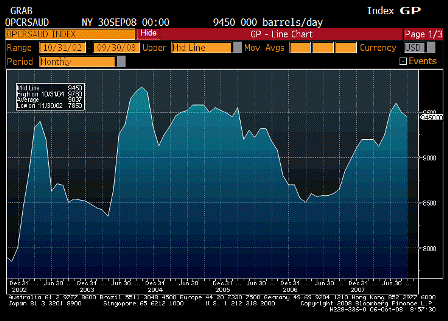
Saudi Oil Production
[top]

Production falling some but overall demand probably remains high, as reported inventories remain very low, as the GMIL (Great Master’s Inventory Liquidation) may still be a factor as more pension funds resist adding to passive commodity strategies.
Several months ago a Saudi official said he though $85 was the ‘right’ price, but that doesn’t mean it’s their target.
They are still price setter, until their production is forces down by several million bpd by excess supply.
Meanwhile, lower crude prices both support the $US and help keep a lid on headline inflation.
OPEC September Crude Output Down 425,000 Bbl/Day to 32.19 Million
New York, Oct. 3 (Bloomberg) Crude-oil production from the 13 OPEC members in September declined 425,000 barrels a day from August, the latest Bloomberg survey of producers, oil companies and industry analysts shows. Figures are in the thousands of barrels a day.
Opec Production
September 2008
Opec Country Sept. Est. Aug. Output Monthly Change Nov. 1 Target Est. vs. Target Est. Cap. (@) Algeria 1,400 1,410 -10 1,357 43 1,450 Angola** 1,800 1,880 -80 1,900 -100 1,930 Ecuador 500 500 0 520 -20 500 Indonesia 865 865 0 865 0 900 Iran 3,950 4,080 -130 3,817 133 4,100 Iraq** 2,135 2,310 -175 — — 2,500 Kuwait# 2,600 2,600 0 2,531 69 2,650r Libya 1,720 1,630 90 1,712 8 1,750 Nigeria 1,880 1,940r -60 2,163 -283 2,200 Qatar 880 880 0 828 52 900 Saudi Arabia# 9,450 9,500 -50 8,943 507 10,800 U.A.E 2,650 2,660 -10 2,567 83 2,800r Venezuela 2,360 2,360 0 2,470 -110 2,500 Total OPEC-13 32,190 32,165r -425 — — 34,980r Total OPEC-12* 30,055 30,305r -250 29,673 382 32,480r **Iraq has no quota. Quotas effective Nov. 1, except for OPEC’s newest members,
Angola and Ecuador, who were formally assigned output targets Dec. 5, 2007.
OPEC announced a quota target of 28.808 million bbls/day at its Sept. 10
meeting but that figure excludes Indonesia who plans to leave the producer formally at year-end.Totals rounded.
r = revised @ = Capacity attainable within 30 days and sustainable for 90 days.
# Includes Neutral Zone production shared equally between Saudi Arabia & Kuwait.
[top]
Probably worse after today.
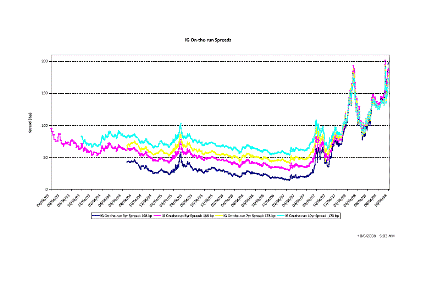
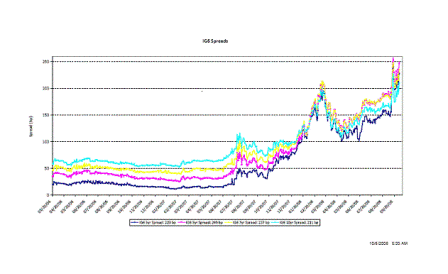
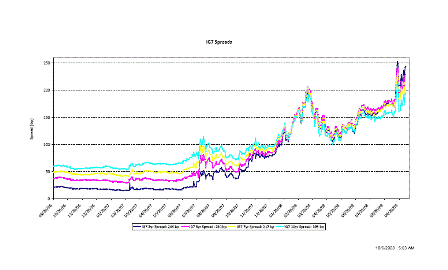
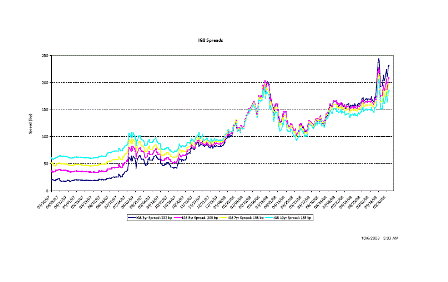
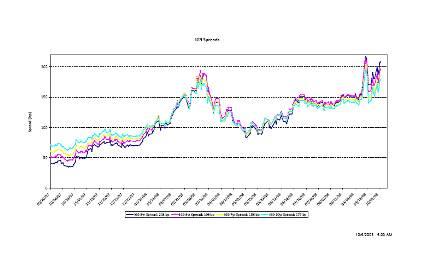
[top]
This will only move them closer to brink of investors refusing to buy their debt.
EU leaders agree to relax Stability Pact rules (Roundup)
by Siegfried Mortkowitz
Paris – To help prop up their banking systems, European leaders meeting Saturday in Paris agreed to loosen the requirements of the European Union’s Stability and Growth Pact, which imposes rules on member states regarding their public spending.
French President Nicolas Sarkozy, German Chancellor Angela Merkel, British Prime Minister Gordon Brown and Italian Prime Minister Silvio Berlusconi also called for an international conference of the 14 largest industrial nations to ‘rebuild the international finance system,’ as Sarkozy phrased it.
Also attending the mini-summit of the EU’s four members of the G8 group of industrial nations were European Commission head Jose Manuel Barroso, European Central Bank (ECB) president Jean-Claude Trichet and the head of the Eurogroup, Luxembourg Prime Minister Jean-Claude Juncker.
The meeting was called by Sarkozy, currently president of the EU, to formulate a common European position to surmount the finance crisis.
A statement released after the talks said, ‘The application of the Stability and Growth Pact should also reflect the current exceptional circumstances.’
This was a victory for Sarkozy, whose closest advisor, Henry Guaino, earlier this week had declared: ‘Temporarily, (the Stability Pact) is not the priority of priorities. The priority is to save the world banking system and therefore save citizens’ savings.’
The criteria, set out in the Treaty of Maastricht, include a national budget deficit totalling less than 3 per cent of gross domestic product (GDP) and public debt not exceeding 60 per cent of GDP.
The leaders at the meeting also called for an international conference on the financial crisis that would include the G8 countries and large developing economies such as China, India, Brazil and South Africa.
‘We will work with all major economies to rebuild the international banking system,’ Berlusconi told journalists when asked about the purpose of the meeting of the so-called G14.
Sarkozy said the aim of the international conference would be to construct ‘the foundation of an entrepreneurial capitalism instead of a speculative capitalism. We want to build the beginning of a new financial world as they did in Bretton Woods.’
The 1944 international meeting in Bretton Woods established the rules for commercial and financial relations among the world’s major industrial states.
The EU leaders also agreed to work to change European accounting rules, increase regulation of credit rating agencies and hedge funds and alter the way executives are rewarded, in order to prevent the payment of ‘golden handshakes’ – that is, exorbitant severance payments – to executives who have created risk for their companies.
‘Executives who failed must be penalized,’ Sarkozy said.
The summit was preceded by a controversy over a proposal to create a 300-billion-euro (413-billion-dollar) fund to bail out struggling financial insitutions, similar to the plan passed by the US House of Representatives and signed into law by President George W Bush late Friday.
Reportedly supported by the Dutch and the French, the idea was summarily rejected by Germany and Britain, and was not on the summit’s agenda.
Sarkozy told journalists that the idea was not his.
‘I never assumed it, I never proposed it, I never imagined it,’ Sarkozy said.
Instead, in line with German and British wishes, each EU member state is to aid its troubled banks with its own funds, but after discussions with other countries, a reference to the unilateral decision by the Irish government to establish a 100-per-cent guarantee for depositors in the six largest Irish-owned banks.
The move, made without consultation with the European Commission, has already attracted investors away from British banks, and has put pressure on the Brown government government to match it.
Merkel said that the European Commission and the ECB would talk to the Irish about their move, which contravenes the EU’s state aid and competition requirements.
‘But my satisfaction about (this solution) is limited,’ the German chancellor said.
Decisions taken at Saturday’s mini-summit are to be further elaborated at Tuesday’s meeting of EU finance ministers and at the October 15-16 EU summit in Brussels.
[top]
In addition to the financial drag on the governments needed to keep their banks and their payments system functioning, they now face an indirect but more potent force:
Falling tax revenues as incomes and assets fall.
Unlike nations with fiscal authorities (most everyone- US, UK, Japan, Russia, etc.) at the federal level who can write ANY size check (in local currency) that won’t bounce, the eurozone national governments are subject to constraint by market forces much like that faced by the US states.
When the risk of growing national deficits scares away investors from buying their debt it’s ‘game over’.
The payments system gets shut down and stays shut until it’s reorganized with expanded (fiscal) powers probably for the European Parliament and the ECB.
They need to grant these institutions with the operational capability to run unlimited budget deficits the authority to guarantee bank deposits and to deficit spend in general.
For the US my remedy remains:
Yes, it’s still that simple for America to ‘save itself and the world’.
Write your Congressman and other political leaders ASAP!
[top]